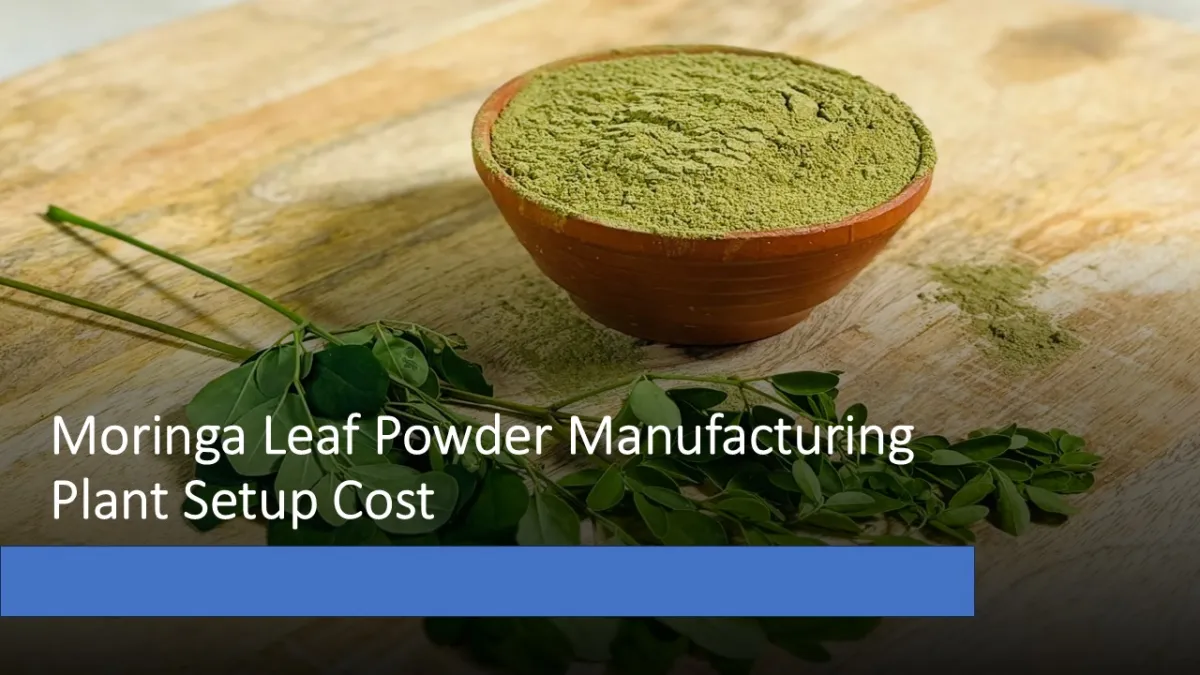Moringa Leaf Powder Manufacturing Cost Report 2025: Detailed Guide On Plant Setup, Capex/Opex And Profitability
Launching a moringa leaf powder plant includes sourcing moringa leaves, cleaning, drying (typically via low-temperature or shade methods), milling into fine powder, quality testing, and packaging. Efficient production requires investment in drying equipment, grinders, sieves, packaging lines, storage facilities, and compliance with food safety standards. With growing demand for natural health products, this setup offers strong potential for both business and social impact.
IMARC Group's report, titled “Moringa Leaf Powder Manufacturing Plant Setup Cost 2025: Industry Trends, Plant Setup, Machinery, Raw Materials, Investment Opportunities, Cost and Revenue,” provides a complete roadmap for setting up a Moringa Leaf Powder manufacturing plant. It covers a comprehensive market overview to micro-level information such as unit operations involved, raw material requirements, utility requirements, infrastructure requirements, machinery and technology requirements, manpower requirements, packaging requirements, transportation requirements, etc.
Moringa Leaf Powder Industry Outlook 2025
By 2025, the moringa leaf powder market is poised for robust expansion, driven by the rising global demand for plant-based nutrition and wellness products. The moringa products market overall is projected to reach nearly USD 9.8 billion, with leaf powder being the largest segment at around 33% share. Meanwhile, forecasts estimate the global moringa leaf powder market to grow from approximately USD 584 million in 2024 to over USD 1 billion by 2032, with a steady CAGR of about 6.2%. In addition, consumer interest remains high-search data shows“moringa leaf powder” peaked at maximum popularity in July 2025, indicating consistent year-round demand.
Request for a Sample Report : https://www.imarcgroup.com/moringa-leaf-powder-manufacturing-plant-project-report/requestsample
Key Insights for Setting Up a Moringa Leaf Powder Manufacturing Plant
Detailed Process Flow
-
Product Overview
Unit Operations Involved
Mass Balance and Raw Material Requirements
Quality Assurance Criteria
Technical Tests
Project Details, Requirements and Costs Involved:
-
Land, Location and Site Development
Plant Layout
Machinery Requirements and Costs
Raw Material Requirements and Costs
Packaging Requirements and Costs
Transportation Requirements and Costs
Utility Requirements and Costs
Human Resource Requirements and Costs
Capital Expenditure (CapEx) and Operational Expenditure (OpEx) Analysis:
Project Economics:
-
Capital Investments
Operating Costs
Expenditure Projections
Revenue Projections
Taxation and Depreciation
Profit Projections
Financial Analysis
Profitability Analysis:
-
Total Income
Total Expenditure
Gross Profit
Gross Margin
Net Profit
Net Margin
Key Cost Components
. Land and Infrastructure: Acquisition of land, facility construction, drying areas, and storage facilities.
. Machinery and Equipment: Dryers (solar or mechanical), milling machines, sieves, and packaging machinery.
. Raw Materials: Procurement of moringa leaves (fresh or dried), possibly organic-certified inputs.
. Labor and Workforce: Hiring and training for harvesting, processing, quality control, and packaging teams.
. Technology and R&D: Process optimization for nutrient retention, product development, and shelf-life extension.
. Utilities: Energy (electricity, fuel), water, and possibly refrigeration depending on climate.
. Quality Control and Testing: Labs for microbial safety, nutritional analysis, and certification setups.
. Packaging and Logistics: Airtight packaging materials, labeling systems, warehousing, and distribution.
. Regulatory and Compliance Costs: Food safety certifications, organic labels, and environmental permits.
Economic Trends Influencing Moringa Leaf Powder Plant Setup Costs 2025
. Expanding Market Demand: Growing consumer preference for plant-based supplements and superfoods.
. Online Retail Momentum: E-commerce platforms are significantly driving product accessibility and sales.
. Raw Material Supply Stability: Regions like India offer abundant moringa cultivation, helping control input costs.
. Energy Cost Variability: Drying and processing operations may be affected by fluctuating utility prices.
. Regulatory Growth: Demand for clean-label, organic, and certified products may elevate compliance costs.
. Export Potential: Rising global interest, especially from Europe and North America, opens enhanced export opportunities.
Request For Customization: https://www.imarcgroup.com/request?type=report&id=17839&flag=E
Challenges and Considerations for Investors
. Supply Chain Reliability: Securing consistent, high-quality leaf supply, potentially with certification needs.
. Capital Investment: Initial outlay for climate-controlled drying, processing, and quality infrastructure can be substantial.
. Quality & Certification Complexity: Maintaining nutritional integrity and obtaining organic/Superfood claims require rigorous testing.
. Market Competition: Established global brands may challenge market entry-differentiation is crucial.
. Consumer Education: In some markets, moringa awareness may still be low, necessitating marketing and outreach.
. Export Logistics: Handling international regulations, shipping costs, and market entry barriers.
Conclusion:
Moringa leaf powder manufacturing stands out as a compelling opportunity in 2025, aligned with health, sustainability, and wellness trends. With a growing global market, especially in functional foods and supplements, a well-designed production plant can thrive. Success hinges on reliable sourcing, processing efficiency, stringent quality control, and strategic market positioning to capture both domestic and export demand.
About Us:
IMARC Group is a global management consulting firm that helps the world's most ambitious changemakers to create a lasting impact. The company excel in understanding its client's business priorities and delivering tailored solutions that drive meaningful outcomes. We provide a comprehensive suite of market entry and expansion services. Our offerings include thorough market assessment, feasibility studies, company incorporation assistance, factory setup support, regulatory approvals and licensing navigation, branding, marketing and sales strategies, competitive landscape, and benchmarking analyses, pricing and cost research, and procurement research.
Contact Us:
IMARC Group
134 N 4th St. Brooklyn, NY 11249, USA
Email: sales[@]imarcgroup.com
Tel No:(D) +91 120 433 0800
United States: (+1-201971-6302)
Legal Disclaimer:
MENAFN provides the
information “as is” without warranty of any kind. We do not accept
any responsibility or liability for the accuracy, content, images,
videos, licenses, completeness, legality, or reliability of the information
contained in this article. If you have any complaints or copyright
issues related to this article, kindly contact the provider above.
Most popular stories
Market Research

- Kucoin Presents Kumining: Embodying Simple Mining, Smart Gains For Effortless Crypto Accumulation
- BILLY 'The Mascot Of BASE' Is Now Trading Live On BASE Chain
- Primexbt Launches Empowering Traders To Succeed Campaign, Leading A New Era Of Trading
- United States Animal Health Market Size, Industry Trends, Share, Growth And Report 2025-2033
- United States Lubricants Market Growth Opportunities & Share Dynamics 20252033
- Japan Buy Now Pay Later Market Size To Surpass USD 145.5 Billion By 2033 CAGR Of 22.23%






















Comments
No comment